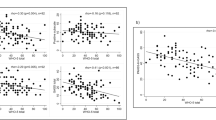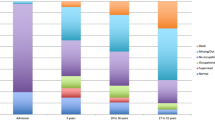Abstract
The aim of this study was to determine whether clinical status at 6-month follow-up is a predictor of 2-year clinical status in first-admission schizophrenic patients. If short-term status is indeed a strong predictor of subsequent functioning, the relationship would support earlier initiation of aggressive interventions. An epidemiologically based sample of 162 first-admission schizophrenic patients was examined at index hospitalization and at 6- and 24-month follow-up, using a variety of diagnostic and clinical assessment instruments. Respondents were divided into three groups based on their 6-month clinical status: delusions or hallucinations present at 6-month follow-up with or without negative symptoms (n = 63); moderate to high levels of negative symptoms (but not positive symptoms) present (n = 42); neither positive nor negative symptoms present (n = 57). Differences in 24-month clinical functioning were evaluated (GAF scores, BPRS factors, role functioning, number of rehospitalizations, and illness course). No significant differences were found among the three groups on demographic characteristics, substance abuse history, or extent of treatment during the follow-up. At 24-month follow-up, respondents with positive psychotic symptoms at 6-month follow-up had the worst, and those with no positive or negative symptoms the best functioning, with the negative-symptom group intermediate on most indices. Thus, among schizophrenic patients, poor 6-month clinical status identified a patient subgroup at high risk for continued poor clinical status at 24 months, suggesting the need for earlier intensive intervention in an attempt to prevent this progression.
Similar content being viewed by others
REFERENCES
Kane J, Honigfeld G, Singer J, Meltzer H: Clozapine for the treatment-resistant schizophrenic: a double-blind comparison with chlorpromazine. Arch Gen Psychiatry 1988; 45:789–796
Marder SR, Meibach RC: Risperidone in the treatment of schizophrenia. Am J Psychiatry 1994; 151(6 suppl.):825–835
Lieberman JA, Safferman AZ, Pollack S, Szymanski S, Johns C, Howard A, Kronig M, Bookstein P, Kane JM: Clinical effects of clozapine in chronic schizophrenia: response to treatment and predictors of outcome. Am J Psychiatry 1994; 151:1774–1752
Carpenter WT Jr, Conley RR, Buchanan RW, Breier A, Tamminga CA: Patient response and resource management: another view of clozapine treatment of schizophrenia. Am J Psychiatry 1995; 152:827–832
Ereshefsky L: Treatment strategies for schizophrenia. Psychiatr Ann 1995; 25:285–296
Wasylenki DA: Psychotherapy of schizophrenia revisited. Hosp Commun Psychiatry 1992; 43:123–127
Burns BJ, Santos AB: Assertive community treatment: an update of randomized trials. Psychiatr Serv 1995; 46:669–675
Meltzer HY, Cola P, Way L, Thompson PA, Bastani B, Davies MA, Snitz B: Cost effectiveness of clozapine in neuroleptic-resistant schizophrenia. Am J Psychiatry 1993; 150:1630–1638
Ghaemi SN, Ziegler DM, Peachey TJ, Goodwin FK: Cost-effectiveness of clozapine therapy for severe psychosis. Psychiatr Serv 1998; 49:829–831
Rosenheck R, Cramer J, Xu W, Thomas J, Henderson W, Frisman L, Fye C, Charney D: A comparison of clozapine and haloperidol in hospitalized patients with refractory schizophrenia. Department of Veterans Affairs Cooperative Study Group on Clozapine in Refractory Schizophrenia [see comments]. N Engl J Med 1997; 337:809–815
Albright PS, Livingstone S, Keegan DL, Ingham M, Shrikhande S, LeLorier J: Reduction of healthcare resource utilisation and costs following the use of risperidone for patients with schizophrenia previously treated with standard antipsychotic therapy—-a retrospective analysis using the Saskatchewan Health Linkable Databases. Clin Drug Invest 1996; 11:289–299
Tollefson GD, Beasley CM Jr, Tamura RN, Tran PV, Potvin JH: Blind, controlled, long-term study of the comparative incidence of treatment-emergent tardive dyskinesia with olanzapine or haloperidol. Am J Psychiatry. 197; 154:1248–1254
Davies A, Langley PC, Keks NA, Catts SV, Lambert T, Schweitzer I: Risperidone versus haloperidol: II. cost-effectiveness. Clin Ther 1998; 20:196–213
Marder SR, Van Putten T: Who should receive clozapine? Arch Gen Psychiatry 1988 45:865–867
Hoge MA, Davidson L, Griffith EE, Sledge WH, Howenstine RA: Defining managed care in public sector psychiatry. Hosp Commun Psychiatry 1994; 45:1085–1089
Garnick DW, Hendricks AM, Dulski JD, Thorpe KE, Horgan C: Characteristics of private-sector managed care for mental health and substance abuse treatment. Hosp Commun Psychiatry 1994; 45:1201–1205
Breier A, Buchanan RW, Kirkpatrick B, Davis OR, Irish D, Summerfelt A, Carpenter WT Jr: Effects of clozapine on positive and negative symptoms in outpatients with schizophrenia. Am J Psychiatry 1994; 151:20–26
Bromet EJ, Jandorf L, Fennig S, Lavelle J, Kovasznay B, Ram R, Tanenberg-Karant M, Craig T: Premorbid and clinical predictors of short-term course in first-admission psychotic patients: Preliminary results. Psychol Med 1996; 26:953–962
Spitzer RL, Williams J, Gibbon M, First MB: The Structured Clinical Interview for DSM-III-R (SCID) I: history, rationale and description. Arch Gen Psychiatry 1992; 49:624–629
Fennig S, Kovasznay B, Rich C, Ram R, Pato C, Miller A, Rubinstein J, Carlson G, Schwartz JE, Phelan J, Lavelle J, Craig T, Bromet E: Six-month stability of psychiatric diagnosis in first admission patients with psychosis. Am J Psychiatry 1994; 151:1200–1208
Andreasen NC, Arndt S, Alliger R, Miller D, Flaum M: Symptoms of schizophrenia: methods, meanings, and mechanisms. Arch Gen Psychiatry 1995; 52:341–351
Jablensky A, Sartorius N, Ernberg G, Anker M, Korten A, Cooper JE, Day R, Bertelsen A: Schizophrenia: manifestations, incidence and course in different cultures. A World Health Organization ten-country study. Psychol Med 1992(monograph suppl 1992); 20:1–97
Woerner MG, Mannuzza S, Kane JM: Anchoring the BPRS: an aid to improved reliability. Psychopharm Bull 1988; 24:112–117
Heinrichs DW, Hanlon TE, Carpenter WT Jr: The Quality of Life Scale: an instrument for rating the schizophrenic deficit syndrome. Schizophr Bull 1984; 10:388–398
Marengo J, Harrow M, Sands J, Galloway C: European versus United States data on the course of schizophrenia. Am J Psychiatry 1991; 148:606–611
Hegarty JD, Baldessarini RJ, Tohen M, Waternaux C, Oepen G: One hundred years of schizophrenia: a meta-analysis of the outcome literature. Am J Psychiatry 1994; 151:1409–1416
Ram R, Bromet EJ, Eaton WW, Pato C, Schwartz JE: The natural course of schizophrenia: a review of first-admission studies. Schizophr Bull 1992; 18:185–201
Chouinard G, Jones B, Remington G, Bloom D, Addington D, MacEwan GW, Labelle A, Beauclair L, Arnott W: A Canadian multicenter placebo-controlled study of fixed doses of risperidone and haloperidol in the treatment of chronic schizophrenic patients. J Clin Psychopharm 1993; 13:25–40
Marder SR, Meibach RC. Risperidone in the treatment of schizophrenia. Am J Psychiatry 1994; 151:825–835
Peuskens J. Risperidone in the treatment of patients with chronic schizophrenia: a multi-national, multi-centre, double-blind, parallel-group study versus haloperidol. Risperidone Study Group. Br J Psychiatry. 1995; 166:712–26
Keefe RSE, Mohs RC, Losonczy MF, Davidson M, Silverman JM, Kendler KS, Horvath TB, Nora R, Davis KL: Characteristics of very poor outcome schizophrenia. Am J Psychiatry 1987; 144:889–895
Wolkin A, Barouche F, Wolf AP, Rotrosen J, Fowler JS, Shiue CY, Cooper TB, Brodie JD: Dopamine blockade and clinical response: evidence for two biological subgroups of schizophrenia. Am J Psychiatry 1989; 146:905–908
Peralta V, de Leon J, Cuesta MJ: Are there more than two syndromes in schizophrenia? a critique of the positive-negative dichotomy. Br J Psychiatry 1992; 161:335–343
Yates WR, Jacoby CG, Andreasen NC: Cerebellar atrophy in schizophrenia and affective disorder. Am J Psychiatry 1987; 144:465–467
Smith JV, Birchwood MJ: Specific and non-specific effects of educational intervention with families living with a schizophrenic relative. Br J Psychiatry 1987; 150:645–652
Liddle PF: Schizophrenic syndromes, cognitive performance and neurological dysfunction. Psychol Med 1987; 17:49–57
Breier A, Schreiber JL, Dyer J, Pickar D: The National Institute of Mental Health longitudinal study of chronic schizophrenia. Arch Gen Psychiatry 1991; 48:239–246
Harrow M, Grinker RR, Silverstein ML, Holzman P: Is modern-day schizophrenia outcome still negative? Am J Psychiatry 1978; 135:1156–1162
Lieberman J, Jody D, Geisler S, Alvir J, Loebel A, Szymanski S, Woerner M, Borenstein M: Time course and biologic correlates of treatment response in first-episode schizophrenia. Arch Gen Psychiatry 1993; 50:369–376
Schooler NR: Translating treatment research findings into clinical action [editorial]. Am J Psychiatry 1994; 151:1719–1721
Harding CM, Zubin J, Strauss JS: Chronicity in schizophrenia: fact, partial fact, or artifact? Hosp Commun Psychiatry 1987; 38:477–486
Author information
Authors and Affiliations
Rights and permissions
About this article
Cite this article
Craig, T., Fennig, S., Tanenberg-Karant, M. et al. Six-Month Clinical Status as a Predictor of 24-Month Clinical Outcome in First-Admission Patients with Schizophrenia. Ann Clin Psychiatry 11, 197–203 (1999). https://doi.org/10.1023/A:1022357312048
Issue Date:
DOI: https://doi.org/10.1023/A:1022357312048




